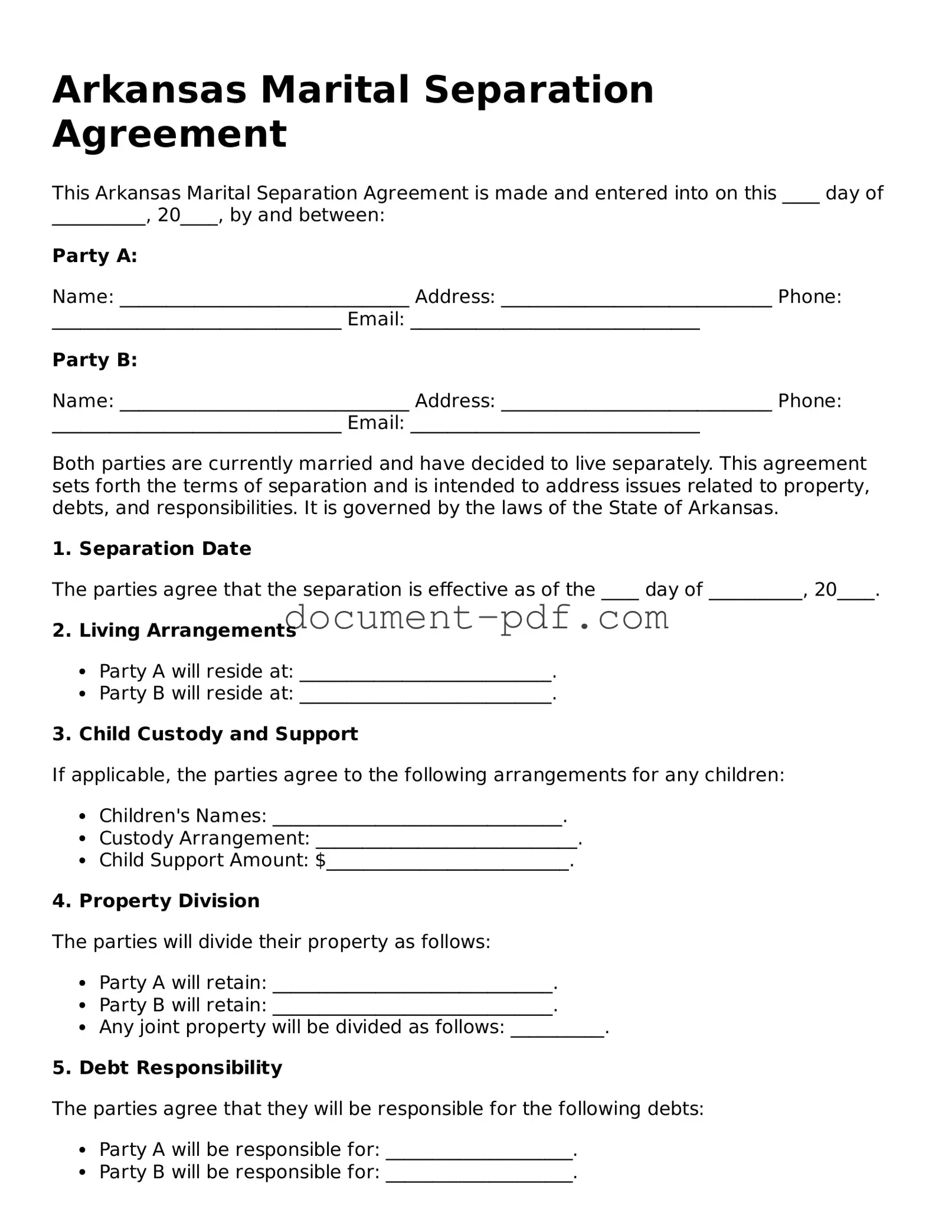The Arkansas Marital Separation Agreement is similar to a Divorce Settlement Agreement. Both documents outline the terms of asset division, child custody, and support obligations. While a marital separation agreement is used when a couple decides to live apart without officially divorcing, a divorce settlement agreement formalizes the terms after the marriage has legally ended. Both documents aim to ensure clarity and fairness in the distribution of responsibilities and assets, but the divorce settlement has the added legal weight of finality.
Another related document is the Separation Agreement. This document serves a similar purpose to the Arkansas Marital Separation Agreement, providing a framework for couples who wish to separate without divorcing. It covers issues like property division, child support, and visitation rights. However, a Separation Agreement may be used in various states and can have different legal implications depending on local laws, making it essential for parties to understand their specific state requirements.
The Child Custody Agreement is closely linked to the Arkansas Marital Separation Agreement, especially when children are involved. This document specifically addresses the custody arrangements for children, including physical and legal custody. While the marital separation agreement may contain provisions about custody, the Child Custody Agreement focuses solely on the best interests of the child, detailing visitation schedules and decision-making responsibilities.
A Property Settlement Agreement is another document that shares similarities with the Arkansas Marital Separation Agreement. This agreement specifically addresses how property and debts will be divided between spouses. While the marital separation agreement may include property division, the Property Settlement Agreement provides a more detailed and legally binding framework for asset distribution, ensuring both parties understand their rights and responsibilities regarding shared property.
The Parenting Plan is also relevant in this context. This document outlines the parenting arrangements for children following a separation or divorce. It addresses issues such as visitation schedules, holiday arrangements, and communication between parents. While the Arkansas Marital Separation Agreement may touch on parenting issues, the Parenting Plan provides a comprehensive guide to co-parenting, ensuring that both parents are on the same page regarding their children's needs.
The Cohabitation Agreement is another similar document, particularly for couples who choose to live together without marrying. This agreement outlines the rights and responsibilities of each partner regarding property, finances, and other shared aspects of their lives. Like the Arkansas Marital Separation Agreement, it aims to prevent disputes and clarify expectations, but it is tailored for couples who are not legally married.
A Prenuptial Agreement, while typically created before marriage, shares some common ground with the Arkansas Marital Separation Agreement. Both documents address asset division and financial responsibilities. However, a prenuptial agreement is designed to protect individual assets and clarify financial expectations before marriage, while a marital separation agreement deals with these issues after the relationship has begun to dissolve.
Understanding the nuances of various legal documents can be crucial when navigating personal transitions, such as separation or divorce. For instance, when gifting property, individuals may find themselves needing to utilize the Texas Affidavit of Gift form, which can be conveniently accessed through Texas PDF Templates. This form helps clarify the terms of the gift, ensuring that all parties involved are on the same page and reducing the risk of future disputes.
Finally, the Domestic Partnership Agreement is similar in that it provides a legal framework for couples who are not married but wish to formalize their relationship. This document outlines the rights and responsibilities of each partner, including financial obligations and property rights. While the Arkansas Marital Separation Agreement focuses on the dissolution of a marriage, the Domestic Partnership Agreement addresses the establishment and maintenance of a non-marital relationship, highlighting the evolving nature of partnerships in contemporary society.

